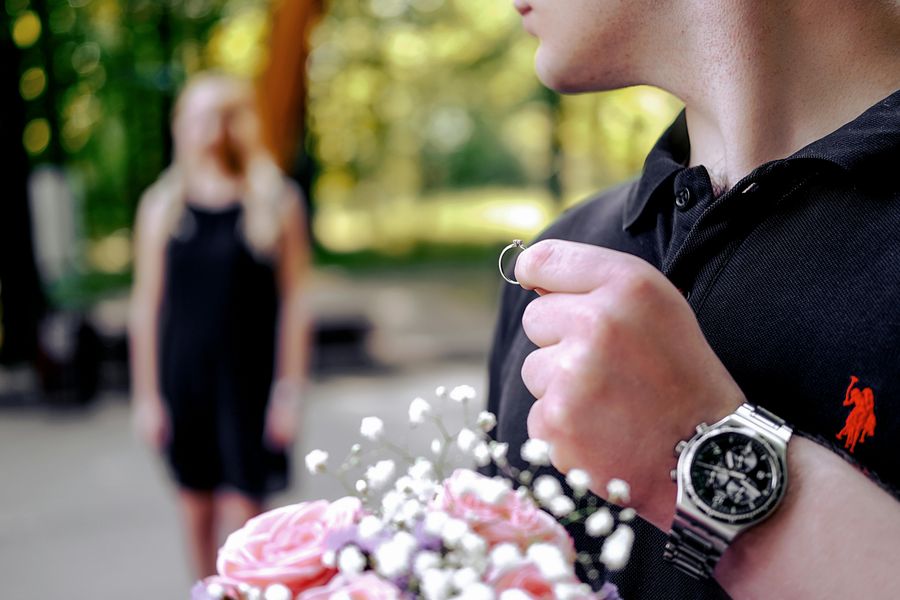Social Anxiety is one of the most common types of mental health disorders, with 15 million Americans dealing with this issue. It can be triggered by different social situations like weddings, which is supposed to be a joyous and memorable celebration.
With the pressure of impressing old acquaintances, being surrounded by strangers, and being the center of attention, it can be challenging for someone with social anxiety to participate and enjoy a wedding party. This article aims to provide tips on how to cope with social anxiety in weddings.
Non-traditional Wedding and Reception
The Wedding industry puts a lot of pressure on couples to follow traditions which can result in an elaborate and stressful celebration. However, it’s important to remember that a wedding should be unique and reflect the couple’s personality and preferences.
Consider having a casual or backyard wedding with a small guest list. This type of intimate ceremony minimizes the pressure of socialization.
Moreover, if the idea of eloping makes you feel more relaxed, do not hesitate to consider it.
Relying on Partner and Loved Ones
Remember that you are not alone because your partner is there to support and help you. As the reception begins, walk around with your partner and stick together as much as possible.
Take advantage of the couple of drinks but do not drink too much in order to feel relaxed and sociable. Realize that while it is important for you to enjoy the moment, you are not that important.
Choosing a Wedding Party
Think about having a small wedding party including your siblings or cousins. They are the people who know and understand you best.
Additionally, you might consider an extended family. Invite people who you are the most comfortable with.
It is easier for you to socialize with people who you can trust and feel comfortable around.
Advance Counseling
As you anticipate the wedding celebration think ahead- write down your concerns, respective of your anxiety. Challenge the accuracy of your social anxiety. Is the situation truly stressful or is it just your perception?
Be optimistic and focus on the positives of the event. Contemplating the positive aspects of the celebration can help you deal with the negative.
Problem-solve towards your areas of concern, focus on turning any negative feelings into positives to help alleviate any anxiety and nervousness.
Remembering It is Only Temporary
Many moments go unnoticed at a wedding celebration; it is okay to make mistakes. The key is to not dwell on them.
Mishaps do not define the wedding, and it’s important to have that mindset and not let something small ruin the moment. Remember that it is not every day you go to a spectacular celebration, and you must take advantage and enjoy the moment.
Coping Mechanisms
It is also good to have some coping mechanisms. Examples include box breathing, unstructured deep breathing, or taking frequent bathroom breaks.
Indulge in activities that take your mind away from anxiety. Find what works best for you to stop anxiety panic attacks before they manifest fully.
Enjoying the Experience
Lastly, focus on the positive experiences. Attending this wedding, although stressful, is helping to orient you better with social situations.
Positive experiences of socialization can help to reduce nervousness in future circumstances, highlighting the potential benefits of exposure therapy.
Social Anxiety and Weddings
Social Anxiety Disorder (SAD) can affect young people, with an increase in occurrence. The thought of meeting several people, interacting with unfamiliar faces, and the possibility of being the center of attention can lead to anxiety.
The Combination of Social Anxiety and Marriage
For most people, a wedding is a time for joy; however, for someone with social anxiety, it’s a daunting prospect. Knowing that people are putting you on a pedestal and scrutinizing you can add extra stress, which can lead to anxiety.
Try to maintain the idea that although important, you do not need to be perfect. Perfection is neither attainable nor necessary.
Social Anxiety Symptoms
Negatively impacting socializing is a symptom of Social Anxiety Disorder. Common ailments include avoiding small talk, fear of judgment, and the fear of people looking at you.
Other signs might include sweating, shaking, stuttering, swallowing difficulties, and more.
Dealing with Wedding Anxiety
Dealing with anxiety in the context of a wedding varies from person to person, however, implementing key steps to manage the anxiety is important. The key step is to talk to someone. You might ask one of the bridesmaids or groomsmen to be your anchor.
They will assist you to socialize, and provide you with a comfortable zone to settle in. Secondly, challenge your irrational thoughts.
Be rational in your thinking about the wedding situation and effectively plan your participation. Thirdly, relax, breathe, pop a calming candy, or try yoga poses to affect distress levels positively.
In conclusion, social anxiety disorder can be challenging, especially in wedding celebrations. However, it is important to remember that it is manageable.
Consider a non-traditional reception, rely on your partner and loved ones, choose a smaller wedding party, and remember that it is only temporary. Find coping mechanisms that work best and remember not to let anxiety ruin the moment.
Most importantly, remember that attending social events is a stepping stone in progressing towards successfully managing social anxiety, making it worth attending that celebration.
3) Alternatives to Traditional Weddings and Receptionsto Non-Traditional Weddings and Receptions
For years, weddings have followed a standard format – engagement, planning the perfect wedding day with loved ones, and the hope of forever after. However, in recent years, we have seen a relaxation of the rules and an increase in non-traditional wedding celebrations.
These alternatives offer couples an opportunity for unique, personalized, and often more relaxed celebrations that better reflect them as a couple. The following are some non-traditional ideas to consider.
Options for Non-Traditional Weddings and Receptions
- Small Guest Lists: Consider inviting only the closest family and friends, allowing you to celebrate with a tight-knit circle. It minimizes the need for social interaction and awkward small talk, ultimately reducing anxiety levels.
- Elopements: This option offers a more private, intimate, and romantic experience, especially if you worry about the pressure of a formal wedding reception. Besides, elopements are usually less costly and require less planning.
- Destination Weddings: These ceremonies offer an array of options for a less traditional celebration, with breathtaking settings and unique cultural experiences. You might opt for a destination wedding with close family and friends, away from the familiar traditional reception.
- It offers you a chance to create unforgettable memories while enjoying a more relaxed environment. Skipping Certain Rituals and Traditions: The traditional reception elements such as speeches, dances, tossing the bouquet, and cutting the cake, can be an excellent source of anxiety.
- You might consider skipping those parts of the reception to reduce stress events.
Involvement of Family and Friends
Accommodating Expectations and Traditions: When considering non-traditional wedding and reception options, it is important to consider the expectations and traditions of family and friends. Involve them in the planning process and seek to find ways of incorporating their expectations and traditions to the non-traditional setting.
Relying on Support of Loved Ones: During a non-traditional reception, it’s essential to have your close family and friends close for support. They can serve as a buffer and provide emotional support for you to have an excellent and enjoyable celebration.
4) Dealing with Anxiety at a Wedding Reception
The Importance of Understanding Social Anxiety
It is vital to understand that social anxiety disorder (SAD) is much more than just shyness or nervousness, common misconceptions. It can be a challenging behavioral disorder that interferes with someone’s social interactions and daily activities.
Some of the symptoms associated with SAD include an intense fear of judgment, difficulty engaging in small talk, sweating, trembling, and an increased heart rate.
Practical Steps to Handle Anxiety
Considering What Triggers Anxiety: Identifying the situations that trigger anxiety is the first step towards handling social anxiety disorder. It might be helpful to write down and reflect on the events that cause stress and avoid them or find ways of managing.
Asking for Help: It’s important to let those close to you know what you’re going through and seek their support. You might also opt to introduce yourself to other guests to reduce anxiety levels and increase socialization.
Finding Ways to Cope with Anxiety: There are several ways of reducing anxiety levels. They include deep breathing techniques, meditation, visualization, and limiting alcohol intake.
Seeking Advance Counseling: Seek psychotherapy or counseling before the celebration, where you can learn various coping mechanisms for anxiety reduction. You can also undergo cognitive behavioral exposure, in which a professional simulates your anxious situation while you learn to manage those feelings and focus on intentional coping techniques.
Encouraging Exposure and Experience
Acknowledge the Benefits of Exposure: Social anxiety disorder symptoms can be stressful, but gradual exposure to social situations might help alleviate Anxiety. Exposing oneself to uncomfortable situations eventually is beneficial to future successes, building one’s confidence in social situations.
Facing Uncomfortable Situations: Understandably, facing uncomfortable situations might seem daunting, but it serves as a stepping-stone towards resolving social anxiety disorder symptoms. Seeking support from those around you, working with a professional in managing your symptoms is an excellent way to manage anxiety during wedding receptions.
In summary, anxiety during Wedding celebrations can be overwhelming, but it doesn’t have to be. Non-traditional receptions and elopements are growing in popularity, allowing for more relaxed and unique celebrations that uniquely reflect the couple.
It is important to communicate with loved ones and healthcare providers, make a conscious effort to identify what triggers anxiety, and seek out strategies for coping with anxiety. Understandably, exposure, and experience, while initially stressful, serve as a valuable tool in conquering social anxiety symptoms, ultimately leading to more enjoyable celebrations.
5) Coping Mechanisms for Social Anxietyto Coping Mechanisms
Dealing with social anxiety can be a daunting task, but one of the most effective ways to manage the disorder is through coping mechanisms. Coping mechanisms are tools or strategies individuals use to manage stress and anxiety, allowing one to lead a more fulfilling life.
It is important to understand how to employ coping strategies that work best for us.
Types of Coping Mechanisms
- Structured Breathing Techniques: Learning to control your breath is an excellent way of coping with intensified feelings of anxiety. Providers suggest structured techniques like box breathing or 4-5-6 breathing.
- These methods help to control levels of elevated anxiety, ultimately leading to a calm mind. Self-Care Practices: Self-care is another effective strategy in reducing anxiety levels.
- Activities such as exercise, meditation, and yoga are great for those dealing with social anxiety. These practices can reduce the risk of anxiety, improve mood, and positively affect an overall sense of well-being.
- Taking Breaks: During a social event, taking breaks can be an effective way of reducing anxiety levels. If you need a break, seek out a quiet place or a place where other people are not present, and re-center yourself.
- A quick walk, practicing deep breathing, or simply taking a timeout can be calming. Seeking Professional Help: If the symptoms of social anxiety disorder are becoming too much, it might be an excellent idea to seek professional help.
- Professionals such as psychologists, psychiatrists, and therapists can provide a safe space to discuss your anxiety and provide support, effective coping strategies, and behavioral therapy.
6) Conclusion
The Importance of Enjoying the Moment
Dealing with social anxiety can be challenging, but embracing coping mechanisms can make occurrences more manageable. Employing practices such as structured breathing techniques, self-care practices, taking breaks, and seeking professional help can help manage stress and anxiety.
Remember to focus on, experiences that bring joy and happiness, and strive to create positive experiences for all. When it comes to social anxiety management, it’s essential to remember to relax and let go, enabling us to celebrate and enjoy the moment without anxiety.
In conclusion, social anxiety can be a challenging disorder to manage, especially during events like weddings that demand social interaction and attention. Non-traditional wedding celebrations, coping mechanisms, and understanding anxiety are necessary to manage the condition.
Coping strategies such as self-care practices, structured breathing techniques, or seeking professional help can serve as valuable resources in reducing anxiety levels. The most critical aspect, however, is to create a positive experience for yourself and your loved ones, remembering to enjoy the moment.
Above all, being aware of the coping mechanisms available and implementing them effectively, enables the management of social anxiety during wedding celebrations.



